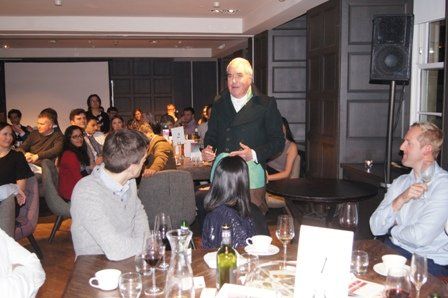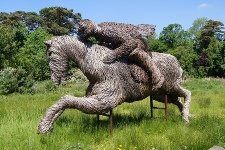Tam O'Shanter
- Ask anybody to name a poem by Robert Burns and the first answer you'll get is likely to be Tam O'Shanter.
This epic tale of the befuddled, overly-refreshed reveller’s night of bonhomie and ribaldry followed by his nightmarish encounter with the warlocks and witches of Alloway has entertained Burns Supper goers for generations.
In a YouGov poll conducted as part of Year of Creative Scotland 2012 it was voted the nation's favourite Burns poem, with almost a quarter of all responders voting for it. It is also said to be the poet's own favourite among all his works and was written for the antiquarian, Francis Grose, who asked him to provide some lines to go with a drawing of Alloway Kirk in his book "The Antiquities of Scotland." He provided 224 of them, allegedly in a single day, or over a weekend, depending on the source you take. Whatever, it was a remarkable achievement.
The poem is by turns, philosophical, hilarious and terrifying and it is wonderfully descriptive, with visual imagery in every line. The tale begins by setting the scene on a market day evening in Ayr when Tam and his friends gather for a boozy session in the pub, unbothered by thoughts of the long trip home or the less than warm welcome that awaits them when they finally make it back to their long suffering wives.
Our hero’s own shrewish wife Kate has berated him for his drinking in the past and predicted that sooner or later it will be the death of him. All, however, to no avail.
Ah, gentle dames! it gars me greet,
To think how mony counsels sweet,
How mony lengthen'd, sage advices,
The husband from the wife despises!
Tam, as usual when there is drink involved, is in the thick of it; knocking back the ale, flirting with the landlady and enjoying the company, including that of his fellow reprobate, Souter Johnny. Outside, a terrible storm is developing, but the legendary drinker, is on top of the world. He simply couldn't care less.
The storm without might rair and rustle,
Tam did na mind the storm a whistle
But all too soon, the evening must come to an end and he has to head home. At this point Burns breaks away from the lowland Scots in which the bulk of the poem is written, and for a few lines, uses standard English to describe just how fleeting are life's moments of pleasure, before reverting to the local dialect with one of literature's most widely quoted aphorisms
But pleasures are like poppies spread,
You seize the flow'r it's bloom is shed;
Or like the snow falls in the river,
A moment white - then melts for ever;
Or like the Borealis race,
That flit ere you can point their place;
Or like the Rainbow's lovely form
Evanishing amid the storm,-
Nae man can tether Time nor Tide,
The hour approaches Tam maun ride;
That hour, o' night's black arch the key-stane,
That dreary hour he mounts his beast in,
And sic a night he taks the road in,
As ne'er poor sinner was abroad in.
A chilling description of the journey follows; the weather is atrocious, the idea of satanic presence is introduced, and even Tam O'Shanter in his thoroughly inebriated state is aware of the potential dangers. His route is marked by past tragedies, which escalate in their degree of horror, culminating in the site of a past child murder and what was regarded at the time as the even more grievous sin of suicide.
At the height of the raging storm, just as the river Doon, in full spate, comes into view, he becomes aware that the old Alloway kirk is brightly lit and that there seems to be a raucous party under way. He tries to move his trusty mare Maggie towards the commotion, but she has more sense than he and stands her ground until he spurs her forward.
Before him Doon pours all his floods,
The doubling storm roars through the woods,
The lightnings flash from pole to pole,
Near and more near the thunders roll,
When glimmering through the groaning trees.
Kirk-Alloway seems in a bleeze,
Through ilka bore the beams were glancing and loud resounded mirth and dancing
Tam is suddenly confronted with the view of male and female witches having a dance, with the devil, in the guise of a huge black dog, raising the rafters with music provided by a set of bagpipes.
The scene set by Burns is one not only of a riotous party, but of horror. Light provided by candles held in the hands of corpses standing in open coffins shows ghastly artefacts that the witches have laid out before them. The poet lists the revolting items in escalating order of dreadfulness, culminating in a knife used for the unforgivable crime of patricide, and with hints of even more unspeakable atrocities.
A knife, a father's throat had mangled,
Whom his son o' life bereft,
The grey hairs yet stack to the heft;
Wi' mair of horrible and awfu'
Which even to name would be unlawfu'
Meanwhile the witches have worked up a stinking sweat and thrown off their clothes until they are garbed only in their undervests. They are all revolting hags with the exception of one good-looking young witch who is dancing particularly vigorously, dressed only in a cutty sark, or vest, which manifestly fails to cover her modesty. Tam, enthralled and bewitched in equal measure, cannot contain himself and shouts out encouragement to the young witch
"Weel done, Cutty-sark!"
Instantaneously the old kirk is plunged into darkness, and Tam barely has time to start his flight on Maggie before the witches burst forth to capture him and drag him to the burning pits of hell.
Nannie, the young witch who had so caught our protagonist’s imagination, is at the vanguard of the horde, and his only hope is to reach the key-stone of the bridge over the Doon, because as was well known, no Satanic creature could venture more than half way across running water.
Burns then builds the narrative of the poem to its dramatic climax, where Nannie, who has all but caught up with Maggie, makes a ferocious leap at Tam, but she underestimates the resolve of the steadfast grey mare, who literally flies over the key-stone of the bridge. She does so, however, at the cost of her tail, which the witch grabs in the very instant that Maggie escapes from her clutches and delivers her master to safety.
For Nannie, far afore the rest,
Hard upon noble Maggie pressed,
And leapt at Tam wi' furious ettle,
But little wist she Maggie's mettle!
Ae spring brought off her master hale,
But left behind her ain grey tail;
The carlin claught her by the rump,
and left poor Maggie scarce a stump.
The tale with the cautionary admonishment that before you indulge in drinking or thoughts of carnal desire you should remember what happened to Tam O'Shanter's mare.
Dressed authentically in the style of clothes Burns would have worn, John delivers a memorable rendition of this Burns classic.



